5. Pi (1998, score by Clint Mansell)
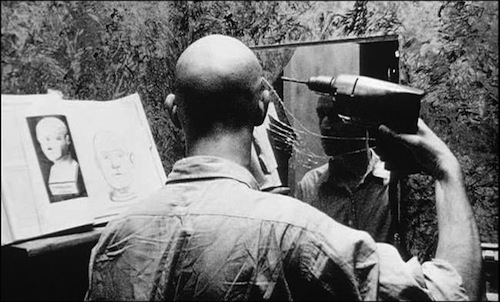
Darren Aronofsky’s debut film opens with the instantly-recognizable single melody of two riffs speaks up from under the rumbling electronic bass. Once the schizophrenic mathematical montage of formulae and brain nerves explodes onto the screen, a furious jungle beat and intense electronic sounds assault the viewer- an aural indicator of the madness to follow.
Pi is a dark film, both figuratively and literally, and it’s a film that requires an abrasive approach to its music. In his first film score, Clint Mansell eschews the typical minimal instrumentation synonymous with low-budget indie films, and goes right for the supersonic jugular with a wild score of techno and electronic sounds.
Mansell aimed to recreate the chaos of a fast-thinking and fast-acting mind and the chaos birthed from never resting and always moving forward. Mansell’s work here could be seen as another example of how music cannot only match the intended emotions, but also elevate them to unknown heights, making them stand out more than ever..
While Mansell’s actual compositions are few and far between in the film (the soundtrack boasts songs by the likes of Aphex Twin and Massive Attack), the tracks by Mansell are featured most prominently and are the ones that’ll stay with audiences long after the credits have all but rolled out.
4. Titus (1999, score by Elliot Goldenthal)
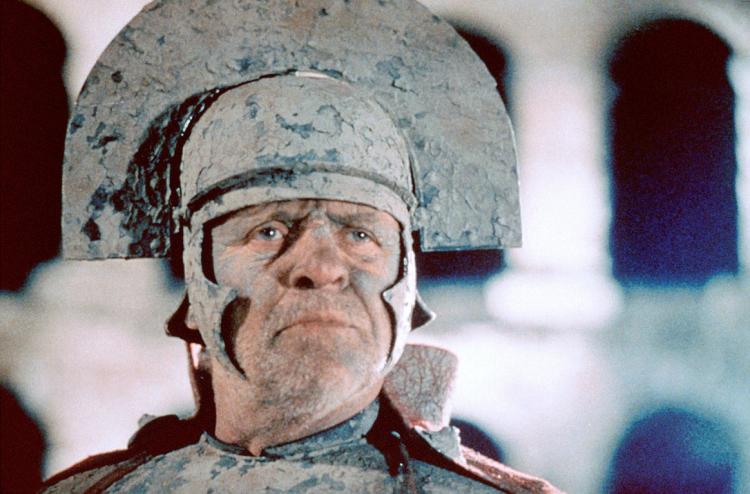
Hot off of such acclaimed scores for films such as Heat, Michael Collins, Interview with the Vampire, and a certain sci-fi horror film (which we’ll discuss in due time), Taymor’s ‘happily unmarried’ partner and sometimes collaborator Elliot Goldenthal was tasked with giving her avant-garde cinematic twist on William Shakespeare’s Titus Andronicus.
Those who’ve seen the film know that Titus transcends any singular time period, utilizing elements from 1930’s fascist Italy, to ancient Rome, and to the sexual excess of the 60’s, even incorporating elements of the 90’s to further the film’s anachronistic design.
Goldenthal, fortunately, created a varied and fascinating score that incorporates everything from jazz fusion to Latin anthems of war to brooding electronica. It’s a score that not only shows the lengths Goldenthal is willing to go to compose the necessary music for even the most off-the-wall projects, but also acts as a demonstration of his keen ear and ability to indulge in genres outside of the typical film music sounds.
Some of cinema’s most daring composers often infuse their scores with different genres to help add to the many moods some films may express with its runtime. Goldenthal understands this in spades, and within the almost three hours it takes for Titus to tell its story, he’s cross-examined a great variety of sounds and genres in order to elevate every moment. And like the best film scores, nothing is lacking in intensity or importance to the plot. The audience feels it all, right from the opening salvo, “Victorious Titus.”
As the old rusted soldiers enter the colosseum, the epic choir of Latin tongues begin heralding the entrance of the Roman army, led by the Roman general Titus Andronicus. It’s an introduction fitting of such a demonstration of an empire’s military might. Goldenthal revels in the chaotic divulges of his score, making for a listening experience as wild and powerful as the film itself.
3. Conan the Barbarian (1982, score by Basil Poledouris)
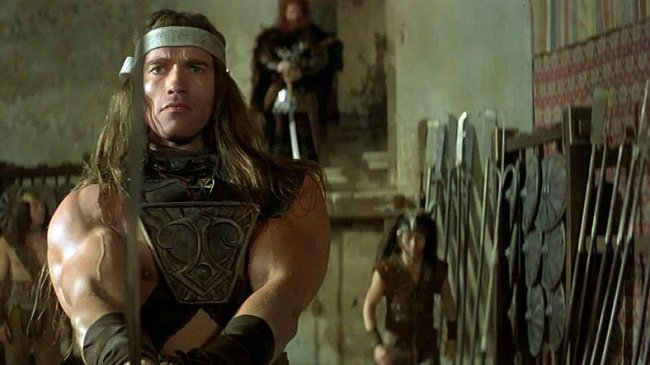
While Arnold Schwarzenegger’s star-making role as the eponymous adventurer is what the pop culture stratosphere remembers most of John Milius’ 1982 cult favourite, fans of the film will always defend the film’s epic score by Basil Poledouris. Today, he’s known for his work on Starship Troopers, RoboCop and RoboCop 3, and The Hunt for Red October, but back in the early 80’s, it was Conan the Barbarian that brought Poledouris’ work to the mind of cinephiles.
Poledouris was, at the end of the day, a traditionalist. His work rarely deviates from the basic orchestral elements of film music, composing already famed works comfortably within those boundries. He’s been able to stay within that classic approach without falling into banality or complacency. While not as famous as other composers who also adhere to the basic blueprint of film music, Poledouris certainly has earned his place in the pantheon of film composers with this suitably epic soundtrack.
Poledouris’ first major score is bombastic, grand, mysterious, and fantastic, just like its source material. Another film with a now-classic opening theme, the epic French horns and heavy drums of “The Anvil of Crom” has become a fantasy movie staple, something any fan could immediately recognize right from its opening monologue.
What follows this opening is more of the same, never letting up in its melodrama or its grand scope. From the tender (albeit cheesy) “Love Theme” of Conan and Valeria, to the exotic and menacing “Atlantean Sword,” Poledouris digs into his romantic and brings us a score that can only be truly described as operatic, perhaps even Wagnerian.
Its reputation as the soundtrack to an admittedly male-centric swords-and-sandals bloodbath certainly gives most cinephiles a strange taste in their mouth, but no one can really deny the excellent composition and perfectly bombastic atmosphere. Music worthy of the Cimmerian’s greatest adventures.
2. Alien 3 (1992, score by Elliot Goldenthal)
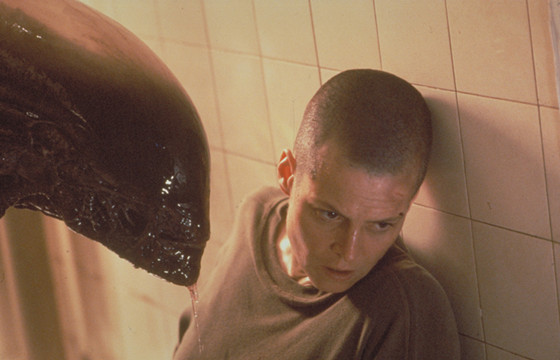
Think, for just a moment, about the music of the Alien franchise. What do you think of? From Goldsmith and Horner, to Frizzell and Streitenfeld, the beloved sci-fi/horror series has always been strong in their respective scores. But, ultimately, it’s Elliot Goldenthal’s masterwork for the flawed but admirable Alien 3 that makes this list. While the film is a hodgepodge of plot holes, studio interference, muddy writing, and less-than-stellar special effects, the score remains the ultimate centerpiece.
In contrast to the other scores in the franchise, Goldenthal’s is abrasive, dark, unsettling. The film’s prison setting and moody set pieces are made all the more disorientating and arresting through the score. It completely eschews traditional melodies and structure, utilizing the outer limits of orchestral film music to accentuate the claustrophobia and paranoia that one would find themselves trapped under in a film such as this.
In its loudest of moments, the viewer is bombarded with great scourges of orchestral dissonance. But the tension never lets up, even when the action quiets down .Goldenthal drives the darkness deep into the core of the music, forgoing the typical bombast of most film scores.
Instead, he crafts a brooding experience that stands not only as film music, but also avant-garde music and even electronic, possibly industrial. Elliot Goldenthal dug deep and struck genius, truly coming into his own with this most disturbing of film music. It’s his shining moment, and for the franchise, its musical peak.
1. Eraserhead (1977, “score” by David Lynch)
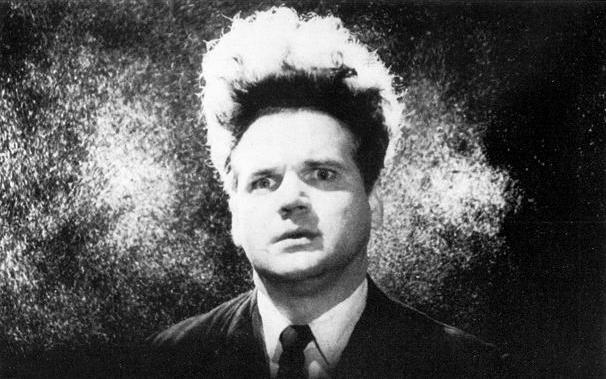
Ask any fan and they’ll tell you that Eraserhead must be experienced in a cinema, at midnight. What’s the cause of such a statement? The sound design that doubles as the score. David Lynch’s midnight movie masterpiece is a film where no decision was made lightly. Lynch apparently spent three months developing the sound design, and the result is a score that is known not only for its perplexing avant-garde nature, but also for its immortal influence on one particular genre of music.
The first method of appreciating Eraserhead’s “music” is by understanding its place in Lynch’s 1977 cult favourite.The industrialized noise and constant barrage of clanging machinery and bellows of steam have become classic elements of Eraserhead’s surreal qualities. They’re the kind of sounds that’re strictly designed to unnerve the listener-viewer.
Not only does this soundscape underline the bizarre dreamscape Lynch’s disturbed characters inhabit and go about their questionable existences, but it does wonders as invokes queasiness in the audience. It’s constant, never ending or letting up. Only is it during the scenes with the lady in the radiator as well as Henry Spencer’s final descent into madness at the film’s climax that great bursts of heightened noise explode to the forefront.
Even more incredible is when one listens to the soundtrack with headphones, when one can hear strange and inexplicable noises far in the distance. There are even moments that suggest that this soundscape is in fact be diegetic, or at least, in a psychological sense.
Eraserhead is infamous for its lack of clear answers, and this merely adds to the mystery. It’s fascinating to take in, both with the film and on its own. Now, any fan of a particular style of experimental music can listen to this minimalistic and formless sound and immediately make connections.
Yes, Eraserhead can in fact be credited with helping to lay the groundwork for dark ambient music. Dark ambient, in essence, is an offshoot of ambient music that is designed entirely to invoke unsettling emotions and reactions in its listeners.
While ambient music can be certainly be traced back to Brian Eno and Tangerine Dream and other early 70’s synthesizer vanguards, David Lynch can be credited with presenting the first distinct example of its genre. There are even early elements of industrial music hidden with the grooves, as the score’s influence can surely be felt within that genre of music as well.
All in all, Eraserhead’s soundtrack is a formless beast of noise and unexplained sounds, as well as an example of how David Lynch’s much-loved “dream of dark and troubling things” has been able to exceed its niche grasp to influence and inspire legions of artists, regardless of genre or medium.
Author Bio: Mason Chennells is an aspiring writer and life-long cinephile living in Alberta, Canada. He usually can be found hiding out in a local theater or library when he’s not writing. He’s also an amateur musician, artist, and novice Esperantist.